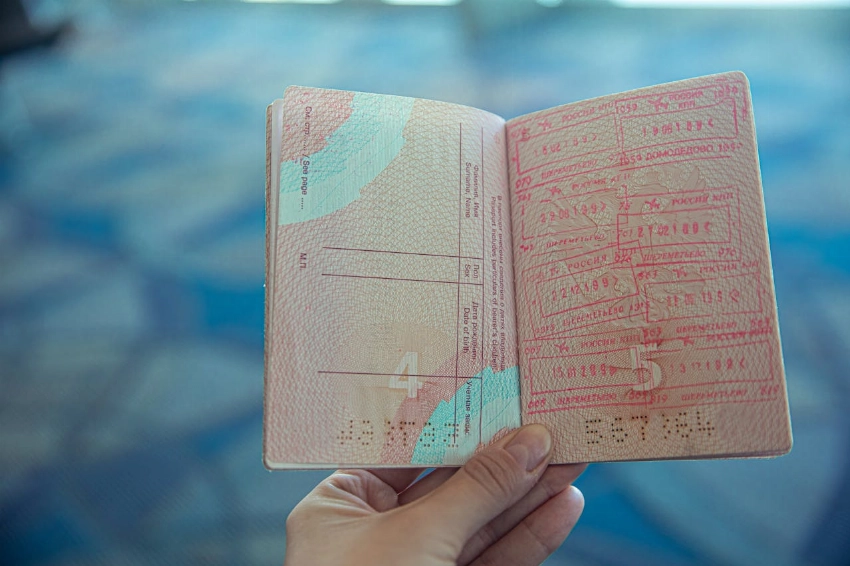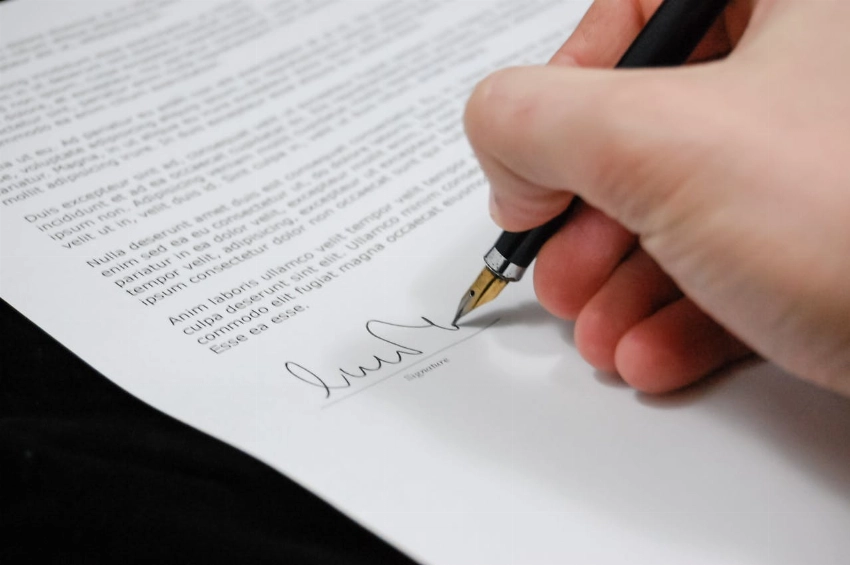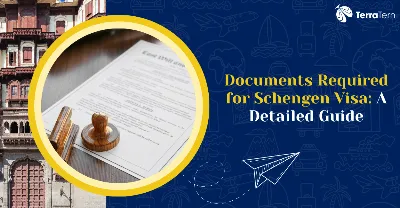Key Highlights
- What Are the Core Personal Documents Required for a Schengen Visa in 2025?
- What Are the Photo Specifications for Schengen Visa Application?
- What Financial Documents Are Required for a Schengen Visa for Indians in 2025?
- Which Travel-Related Documents Are Mandatory for Schengen Visa for Indians in 2025?
- What Is the Schengen Travel Insurance Requirement?
- What Employment Documents Are Needed for Schengen Visa Application?
- What Documents Do Self-Employed Individuals Need for Schengen Visa?
- Which Documents Are Needed for Schengen Based on Travel Purpose?
- What Civil Status Documents Are Required for Schengen Visa?
- How Should Documents Be Prepared and Submitted for a Schengen Visa in 2025?
- What Are Common Document Mistakes That Lead to Schengen Visa Rejection?
- Conclusion
When compiling a 2025 documents required for Schengen visa, it is crucial to collect 11 essential papers since most applications are rejected due to mistakes. Among the things required are a filled application form, three three-month post-departure passports, two 35x45 mm-sized pictures in the recent past, and travel insurance of 30,000 euros. You also need to provide evidence of accommodation, flight confirmation, last three months' bank statements, a cover letter, a visa fee receipt, and copies of past Schengen visa documents. Depending on the purpose of travelling (e.g., tourism, business, study) and employment status, additional Schengen visa documents are needed. Let’s know more about the list of documents for a Schengen visa!
What Are the Core Personal Documents Required for a Schengen Visa in 2025?

The foundation of any successful Schengen visa documents required for Schengen visa application rests on correctly submitted personal identity and travel Schengen visa documents. These are the fundamental items that verify your identity and your authorisation to travel internationally.
How Should Your Passport Meet Schengen Visa Requirements?
The most important document is your passport, which needs to meet five specific requirements to be qualified as a valid document in the process of a document required for Schengen visa application. Any incident of not satisfying any of these requirements may result in automatic rejection.
-
Issuing Date: The passport should have been issued not more than a decade ago. Passports that are more than ten years old are not held regardless of remaining validity.
-
Validity Period: The passport has to be valid for a minimum of three months before your departure date from the Schengen area. Taking the example, in case you intend to exit the Schengen area on October 1, 2025, your passport should have a validity of at least January 1, 2026.
-
Blank Pages: No fewer than two blank pages are demanded to stamp a visa. These pages must be adjacent.
-
Bio-Data Page Cleanliness: The bio-data page has to be readable and clear without any observation or remarks that may be against the normal international travel practice.
-
Signature: In the designated space, the passport has to have your signature.
-
India-Specific Requirement: Applicants in India should provide copies of all of their old passports, in particular those that have old visas. In the case of loss of an old passport, a first information report (FIR) and a surrender certificate/ cancellation certificate of the concerned authority should be provided as evidence.
|
Passport Criterion |
Valid Scenario |
Invalid Scenario |
|
Validity |
Expires on January 1, 2026, for a trip ending September 30, 2025. |
Expires on November 30, 2025, for a trip ending September 30, 2025. |
|
Issuance |
Issued on July 1, 2018. |
Issued on July 1, 2014. |
|
Blank Pages |
Two fully blank pages are available. |
Only one blank page or only used pages are available. |
What Are the Photo Specifications for Schengen Visa Application?
The photographs submitted must strictly adhere to the International Civil Aviation Organization (ICAO) standards. Incorrect photos are a very common reason for application delays. Let’s know more about the documents required for Schengen visa:
-
Dimensions: The photos must measure exactly 35mm in width by 45mm in height.
-
Background: A plain white or light grey background is mandatory.
-
Facial Coverage: The face must cover 70 to 80 per cent of the photo area, measuring 32-36mm from chin to crown.
-
Recency: The photos must have been taken within the last six months and must be a true likeness of your current appearance.
-
Expression and Pose: Maintain a neutral expression with a closed mouth. The face must be clearly visible, facing straight ahead.
-
Quality: High-resolution color photos printed on quality photographic paper are required. No digital alterations, filters, or airbrushing are permitted.
-
Common Rejection Reason: Photos taken more than six months ago or those where the applicant wears glasses, large headwear (unless for religious reasons), or has their face obscured are routinely rejected.
How Do You Complete the Schengen Visa Application Form?
The application form, typically completed through an online system like the VIDEX system for certain countries, requires accurate and complete information covering 37 specific fields. Let’s know more about documents required for Schengen visa!
-
Online Completion: The form must be completed online, printed out, and then signed.
-
Mandatory Sections: Ensure all sections covering personal information, travel details (duration, dates, planned entry/exit), detailed information on the inviter or accommodation provider, and financial support means are filled out completely.
-
Signature: The application form must be signed by the applicant in all required places (usually lines 37 and the final declaration). For minors, the form must be signed by both parents or the legal guardian.
-
Printing: Print all pages, including the mandatory barcode page, as required by the specific consulate.
Tip: Double-check every field, especially contact numbers, dates of intended stay, and the Schengen area entry/exit points, as discrepancies here can raise suspicion.
Also Read: The Most Common Schengen Visa Rejection Reasons
What Financial Documents Are Required for a Schengen Visa for Indians in 2025?

Demonstrating sufficient financial means to cover all expenses during your stay in the Schengen area and for your return journey is a mandatory requirement. This is often the most scrutinized section of an application. Let’s know more about the documents required for Schengen visa:
|
Financial Document Type |
Requirement Details |
Purpose |
|
Bank Statements |
Last three months of personal bank statements, officially stamped by the bank. |
Proof of regular income, savings, and financial stability. |
|
Salary Slips |
Last three months of pay slips for employed individuals. |
Verification of consistent monthly income. |
|
Income Tax Returns (ITR) |
Last two to three years of ITR-V forms or Form 16. |
Proof of financial history and tax compliance. |
|
Sponsorship Letter |
Required if a third party (host, employer) is covering costs. |
Financial commitment from a sponsor. |
|
Proof of Funds |
Minimum daily required funds (usually 50 to 100 per day in Euro equivalent) based on the country. |
Proof of subsistence funds for the trip duration. |
What Bank Statements Do You Need for Schengen Visa Application?
Bank statements are the primary evidence of your financial capacity. The requirements for Indian applicants are particularly strict regarding the authenticity of these documents. Let’s know more about documents required for Schengen visa:
-
Three-Month History: You must submit your personal bank account statements covering the last three months, up to a few days before the application submission date.
-
Mandatory Bank Stamp: For applicants in India, the statements must have the official stamp and signature of the issuing bank on every page. Photocopies or printouts without the bank’s stamp are typically rejected.
-
Minimum Balance: While the exact amount varies by country (usually 50 to 100 euros per day of stay), your bank balance must be sufficient to cover your trip expenses in addition to your regular living expenses.
-
Passbook Policy: Traditional bank passbook copies are generally not accepted; only formal bank-stamped statements on letterhead are considered valid proof of funds.
-
Third-Party Accounts: If relying on a joint account, a clear explanation and supporting documents proving your access to the funds are required. For third-party sponsorship, a formal sponsorship letter is mandatory.
How Does a Sponsorship Letter Work for a Schengen Visa?
If your trip is entirely or partially sponsored by a family member, friend, or a business associate, a formal sponsorship declaration is required, along with the sponsor's financial proof. Let’s know more about the documents required for Schengen visa:
-
Sponsor's Commitment: The letter must clearly state the sponsor's commitment to cover the applicant's expenses, including travel, accommodation, and daily subsistence.
-
Relationship and Declaration: It must declare the exact relationship between the applicant and the sponsor.
-
Sponsor's Financials: The sponsor must provide supporting documents, including their last three to six months' bank statements, employment/income proof, and a copy of their ID (passport or national ID).
-
Legal Declaration: Certain countries, like Germany and France, require a legally binding declaration from the host/sponsor, often obtained from a municipal office (e.g., Verpflichtungserklärung in Germany).
Which Travel-Related Documents Are Mandatory for Schengen Visa for Indians in 2025?

These documents prove the logistics of your trip,when you are entering and leaving, where you will be staying, and your overall plan. Let’s know more about documents required for Schengen visa:
What Type of Flight Reservation Is Required for Schengen Visa?
A common and critical mistake applicants make is purchasing non-refundable, confirmed flight tickets before visa approval. Only a confirmed flight reservation or itinerary is required.
1. Itinerary, Not Ticket: You must submit a document showing a reserved seat on a plane for your round-trip journey. This reservation should be verifiable and include:
- Passenger's full name.
- Booking reference or PNR.
- Departure and arrival dates and times.
- Flight numbers and airport codes.
2. Validity: The reservation should be valid for a few weeks to cover the visa processing period. Many third-party travel agencies offer reservations specifically for visa purposes.
Critical Note: The embassy requires proof of a planned itinerary, not a financial commitment to a confirmed ticket, which should only be purchased after your visa is approved.
How Do You Prove Accommodation for Your Schengen Trip?
You must provide verifiable proof of accommodation for every single night you plan to spend in the Schengen area.
The four acceptable types of accommodation proof are:
-
Hotel Confirmation Letters: These must be on the hotel’s letterhead and clearly show: the booking code, full dates of stay, the name of the guest (matching the applicant's name), and the hotel’s contact information.
-
Rental Agreements: If renting through a service like Airbnb, submit the confirmed rental agreement that includes the property address, the name of the landlord, and the rental period.
-
Tour Operator Confirmations: If traveling on a pre-booked tour, the letter from the tour operator detailing the hotels, dates, and locations.
-
Host Invitation Letters: If staying with a host (family or friend), an invitation letter along with the host’s proof of address and ID copy is required.
-
Country-Specific Requirement: Some countries, such as France (Attestation d'Accueil) and Austria (Verpflichtungserklärung), require a mandatory, formalized invitation/guarantee of accommodation from the host, which must be obtained from a local authority.
What Is the Schengen Travel Insurance Requirement?
Travel medical insurance is a compulsory document under the documents required for Schengen visa Code and must meet strict financial and geographic coverage criteria.
What Should Schengen Travel Insurance Cover?
Your insurance policy must fulfill four non-negotiable requirements to be accepted by the consulate.
-
Minimum Coverage: The policy must provide a minimum coverage of 30,000 in Euro equivalent for medical expenses.
-
Coverage Scope: It must cover all expenses that might arise in connection with emergency medical treatment, emergency hospital care, and repatriation of mortal remains.
-
Geographic Validity: The insurance must be valid throughout the entire Schengen territory (all 29 member countries).
-
Duration: The policy must be valid for the entire duration of your intended stay, from the date of entry to the date of exit.
-
Key Submission: You must submit the insurance policy certificate, which clearly states the name of the insured, the policy number, the validity dates, and a declaration confirming the 30,000 Euro equivalent minimum coverage.
What Employment Documents Are Needed for Schengen Visa Application?
The documents required to prove your employment or financial status vary significantly based on your current situation. This is necessary to prove your ties to your home country and your ability to finance your trip. Let’s know more about the documents required for a Schengen visa.
What Documents Do Employed Applicants Need for Schengen Visa?
If you are a salaried employee, your application must include documents proving your stable employment and authorized leave. Let’s know more about the documents required for Schengen visa:
The five core documents are:
-
Employment Certificate/Letter: Issued on the company's official letterhead, signed, and stamped. It must state your position, date of joining, salary, and the purpose/duration of your travel.
-
Leave Approval Letter (NOC): A No Objection Certificate (NOC) from your employer granting official leave for your specific travel dates.
-
Salary Slips: The original or certified copies of the last six months of your salary slips.
-
Employment Contract: A copy of your employment contract, if applicable.
-
Income Tax Returns (ITR): Copies of your last two to three years of personal ITR-V forms or Form 16.
Also Read: Schengen Visa Sticker Number: How to Find and Understand?
What Documents Do Self-Employed Individuals Need for Schengen Visa?

For business owners and self-employed professionals, the focus is on proving the legal existence and financial health of your business. Let’s know more about the list of documents for Schengen visa:
The six key documents are:
-
Business Registration Certificate: Proof of the company's registration (e.g., Partnership Deed, Certificate of Incorporation, shop establishment license).
-
GST Registration Certificate: Copy of the Goods and Services Tax (GST) registration.
-
Company Bank Statements: Last six months of the company's official bank statements, bank-stamped.
-
Business ITR: Last two to three years of business ITR with officially audited financial statements and balance sheets.
-
Professional Practice Proof: For doctors, lawyers, or consultants, membership certificates of the respective professional body.
-
Letter of Proprietorship: A letter confirming your status as a sole proprietor or managing partner.
What Documents Do Students Need for Schengen Visa Application?
Students must prove their current enrollment status and provide evidence of financial support, usually from their parents. Let’s know more about the list of documents for Schengen visa:
The core student-specific requirements are:
-
Bonafide Certificate: An original certificate from the educational institution confirming your enrollment status, current semester/class details, and travel dates.
-
Student ID: A clear copy of your valid student identification card.
-
NOC from Institution: A No Objection Certificate from the school/college/university authorizing your absence during the trip.
-
Parents' Financial Documents: The financial documents (bank statements, ITR, employment letter) of the parent(s) acting as sponsors, along with the parents' signed sponsorship letter.
What Documents Do Retired Applicants Need for Schengen Visa?
Retired individuals must submit documentation proving their retirement status and their source of income.
-
Pension Statements: Copies of your pension statements or pension passbook entries for the last six months.
-
Retirement Proof: The official retirement order or letter from your former employer.
-
Financial Proof: In addition to a pension, any other proof of substantial income, such as property rental income agreements or fixed deposit certificates, can be added for stronger financial evidence.
Which Documents Are Needed for Schengen Based on Travel Purpose?
While the core documents are universal, a substantial portion of your application is dedicated to proving the specific purpose of your visit. Let’s know more about the documents required for Schengen visa:
|
Travel Purpose |
Essential Additional Documents |
|
Tourism |
Detailed day-by-day itinerary, confirmed hotel bookings for all nights. |
|
Family/Friends Visit |
Official invitation letter from the host, host's passport/ID, and residence permit copy, and relationship proof. |
|
Business Visit |
Business invitation letter from the European company, conference registration, and a letter from the employer. |
|
Medical Treatment |
Medical reports, hospital/doctor appointment confirmation, treatment cost estimate, and proof of financial arrangement. |
What Additional Documents Do Tourist Visa Applicants Need?
The documentation for tourism must demonstrate a clear and credible plan for your visit, proving you are a genuine tourist. Let’s know more about the documents required for Schengen visa
-
Detailed Day-by-Day Itinerary: A specific, itemized plan for each day of your trip, including the city, planned activity, and transport method (if applicable). This must align with your accommodation and flight reservations.
-
Confirmed Hotel Reservations: Confirmation for every night of your stay, which must match the dates and locations in your itinerary.
-
Tour Package Confirmation: If using a travel agency, the booking confirmation and payment receipt for the package.
What Documents Are Required When Visiting Family or Friends?
When staying with a private host, the documentation centers on the formal invitation and the host's legal status.
-
Invitation Letter: This must be an original letter from the host stating: the host's full name, address, contact details, the purpose of the visit, the exact duration of the stay, and the host's commitment to accommodating the applicant.
-
Host's Documents: A copy of the host's passport or national ID and, if they are not an EU citizen, their valid residence permit.
-
Relationship Proof: Documents proving your relationship with the host, such as birth certificates (for parents/children), marriage certificates (for spouses), or even photographs and correspondence.
What Documents Do Business Travelers Need for Schengen Visa?
Business applications require clear proof of the commercial purpose of the trip and who is financially responsible.
-
Business Invitation Letter: A formal letter on the European company's letterhead stating the purpose of the business meeting (e.g., negotiations, training), the dates of the meetings, and confirmation of who will bear the travel and/or accommodation costs.
-
Employer's Letter: A letter from your Indian employer confirming the business trip's necessity, the applicant's position, and financial responsibility (if applicable).
-
Proof of Previous Dealings: Evidence of existing commercial relationships, such as contracts, invoices, or prior email correspondence, for established business partners.
-
Conference/Fair Proof: If attending an event, proof of registration and the payment receipt.
What Civil Status Documents Are Required for Schengen Visa?
Civil status documents are typically required to prove family ties, especially when traveling with family, or if sponsored by a spouse/relative. Let’s know more about the documents required for Schengen visa:
-
Marriage Certificate: Mandatory if you are applying for a dependent visa or traveling with a spouse.
-
Children's Birth Certificates: Required if traveling with minor children or if the purpose is to visit a parent/child.
-
Divorce/Custody Documents: If divorced, the divorce decree and the court order regarding custody of minors.
Note: These documents often require an Apostille stamp and certified translation if they are not in English or the destination country's language.
What Documents Are Required for Minors Applying for Schengen Visa?
The application for a minor has heightened requirements to ensure the child's safety and legal permission to travel.
The core requirements for a minor are: let’s know more about the documents required for a Schengen visa:
-
Birth Certificate: The original birth certificate must be submitted, often with an Apostille stamp.
-
Both Parents' Consent: A notarized consent letter from the non-traveling parent(s) or legal guardian(s).
-
Parents' Documents: Copies of both parents' passports and, if applicable, the marriage certificate.
-
Custody Order: If parents are separated or divorced, the court's custody order grants custody to the traveling or non-traveling parent.
What Consent Documents Are Needed When Minor Travels With One Parent?
When a minor travels with only one parent, the explicit and legally verified consent of the absent parent is essential:
-
Notarized Authorization: The non-traveling parent must provide a notarized consent letter specifically authorizing the minor's trip, stating the travel dates, destination, and the name of the accompanying parent.
-
Absent Parent's Passport: A clear copy of the non-traveling parent's passport bio-data page.
-
Single-Parent Authority: If one parent has sole custody, the official court order granting sole custody must be presented in place of the absent parent's consent. Similarly, a death certificate is required if one parent is deceased.
How Should Documents Be Prepared and Submitted for a Schengen Visa in 2025?
Proper document preparation is as important as the content itself. Errors in copies, translations, or validity periods are grounds for rejection. Let’s know more about documents required for Schengen visa:
|
Preparation Guideline |
Requirement Details |
Action for Applicant |
|
Original vs. Copy |
Always submit copies, but keep originals ready for presentation. |
Ensure copies are clear and legible. |
|
Certified Translation |
Documents not in English or the destination country's official language. |
Obtain an official translation with the translator's seal and signature. |
|
Validity Period |
Bank statements not older than three months; photographs within six months. |
Check issue dates meticulously before submission. |
|
Apostille Stamp |
Mandatory for birth, marriage, and educational certificates in many countries. |
Initiate the apostille process well in advance (takes time). |
Which Documents Require Certified Translation for Schengen Visa?
Any supporting document that is not in English or the official language of the country you are applying to (e.g., French for France, German for Germany) must be officially translated. Let’s know more about documents required for Schengen visa:
-
Required Translation: Common documents needing translation include marriage certificates, birth certificates, police clearance certificates, and non-English employment/business letters.
-
Certified Standard: The translation must be a certified translation, meaning it must be done by an approved translator or agency and carry their official seal, signature, and declaration of accuracy.
What Documents Need an Apostille Stamp for a Schengen Visa Application?
The Apostille is a certification stamp required under the Hague Convention to authenticate documents for international use. For many Schengen countries, this is mandatory for personal certificates.
The key documents requiring an Apostille from the Ministry of External Affairs (MEA) in India are:
-
Birth Certificates
-
Marriage Certificates
-
Educational Diplomas (if applying for a student visa)
-
Police Clearance Certificates (PCC)
-
Power of Attorney Documents
-
Certain Business Registration Documents
Process: Indian documents must first be attested by the State Home Department or other authorized state bodies before being apostilled by the MEA. This process can take 7–10 working days.
Also Read: Schengen Visa Germany
What Are Common Document Mistakes That Lead to Schengen Visa Rejection?

Documentation errors account for a significant percentage of documents required for Schengen visa rejections. Being aware of the most common mistakes is the best way to prevent them.
-
Unstamped Bank Statements: Submitting digital printouts of bank statements without the official bank stamp and signature is a critical, India-specific error that often leads to rejection.
-
Insufficient Financial Proof: Not meeting the minimum daily subsistence requirement (50–100 in Euro equivalent per day) or having a balance that looks artificially inflated (large, recent deposits without explanation).
-
Missing Old Passports: For Indian applicants, not submitting all previous passports, especially those with past travel history or visas, is a mandatory requirement that, when missed, can halt the process.
-
Incorrect Photo Specifications: Submitting photographs that are too large, too small, or do not adhere to the 70-80 percent facial coverage rule.
-
Insufficient Passport Validity: Failing to ensure the passport is valid for at least three months after the intended date of departure from the Schengen area.
-
Missing Travel Insurance: Submitting a policy that does not explicitly state the 30,000 Euro equivalent minimum coverage for emergency medical treatment and repatriation.
-
Outdated Documents: Bank statements or employment letters older than three months from the date of application submission.
-
Missing Signatures: Forgetting to sign the application form on all designated lines (especially line 37 and the declaration) or not including the required parental signatures for minors.
How Many Documents Do Different Schengen Countries Require?
While the core eleven mandatory documents are the same, popular destination countries may have specific, slightly varying requirements or a more rigorous focus on certain proofs. Applying to the correct embassy (the main destination country or the first entry country for equal stays) is paramount.
|
Country |
Key Specific Requirement for Indian Applicants |
|
Germany |
Mandatory submission of old passports; requires bank statements for the last six months for some applicant categories. |
|
France |
Strict requirement for Attestation d'Accueil for family/friend visits; specific format for travel medical insurance declaration. |
|
Italy |
Expects a highly detailed, day-by-day itinerary and confirmed proof of internal travel (e.g., train bookings). |
|
Spain |
Considers property ownership documents or property rental income documents as strong supplementary financial proof. |
|
Switzerland |
Often requires a slightly higher, conservative financial threshold per day and a very detailed travel plan. |
What Is the Complete Schengen Visa Documents Checklist?
This complete checklist covers all necessary documents and serves as your final review before submitting your application.
|
Document Category |
Document Item |
Mandatory/Optional |
Original/Copy |
Validity Note |
|
Personal & ID |
Completed & Signed Application Form |
Mandatory |
Original |
Current version (VIDEX or similar) |
|
Valid Passport |
Mandatory |
Original |
Three months beyond return date |
|
|
Passport Photos (35x45mm) |
Mandatory |
Original |
Taken within last six months |
|
|
Copies of Old Passports & Visas |
Mandatory (India) |
Copy |
All passports needed |
|
|
Financial Proof |
Personal Bank Statements |
Mandatory |
Copy |
Last three months, bank-stamped |
|
Salary Slips/Pension Statements |
Mandatory |
Copy |
Last six months |
|
|
Income Tax Returns (ITR-V/Form 16) |
Mandatory |
Copy |
Last two to three years |
|
|
Sponsorship Letter & Documents |
Optional (if sponsored) |
Original & Copy |
Sponsor's proof needed |
|
|
Travel Logistics |
Travel Medical Insurance |
Mandatory |
Copy |
Minimum 30,000 Euro equivalent coverage |
|
Round-Trip Flight Reservation |
Mandatory |
Copy |
Not a paid ticket |
|
|
Proof of Accommodation |
Mandatory |
Copy |
For every night (hotel/host invitation) |
|
|
Detailed Day-by-Day Itinerary |
Mandatory |
Copy |
Must align with dates |
|
|
Employment/Status |
Employment Letter & NOC (Employee) |
Mandatory |
Original |
Must be recent, on company letterhead |
|
Business Registration & ITR (Self-Employed) |
Mandatory |
Copy |
Last two years ITR with financials |
|
|
Bonafide Certificate & ID (Student) |
Mandatory |
Original & Copy |
Current enrollment proof |
|
|
Civil Status & Minors |
Marriage Certificate (Apostilled) |
Optional/Mandatory |
Copy |
Required if traveling with spouse/claiming dependency |
|
Child's Birth Certificate (Apostilled) |
Mandatory (for minors) |
Copy |
Must be submitted with the application |
|
|
Notarized Parental Consent Letter |
Mandatory (for minors) |
Original |
Required if traveling with one parent |
Conclusion
Gathering the correct documents required for a Schengen visa application is the most critical factor determining approval success, with documentation errors accounting for over 35 per cent of visa rejections. Indian applicants must prepare 11 core mandatory documents, including a valid passport with three-month post-travel validity, a completed VIDEX application form, recent photographs meeting ICAO standards, 30,000 Euro equivalent travel insurance coverage, three-month bank statements with official bank stamps, accommodation proof, and flight reservations. Additional employment-status documents (employment letter, salary slips, ITR for employees; business license and audited financials for self-employed; enrollment certificates for students; pension statements for retirees) and purpose-specific documents (invitation letters, business meeting confirmations, medical appointment proofs) must be submitted based on individual circumstances.
The key to a successful application lies in meticulous document preparation: ensuring all bank statements are stamped by the issuing bank, submitting old passport copies as mandatory for Indian citizens, obtaining properly translated and apostilled civil status certificates, and maintaining document validity within specified timeframes (bank statements within three months, photographs within six months). Start document collection at least four to six weeks before the intended application date to allow sufficient time for bank statement compilation, apostille processing, and translation services, thereby avoiding last-minute complications that could delay or jeopardise visa approval. Visit TerraTern to know more!






